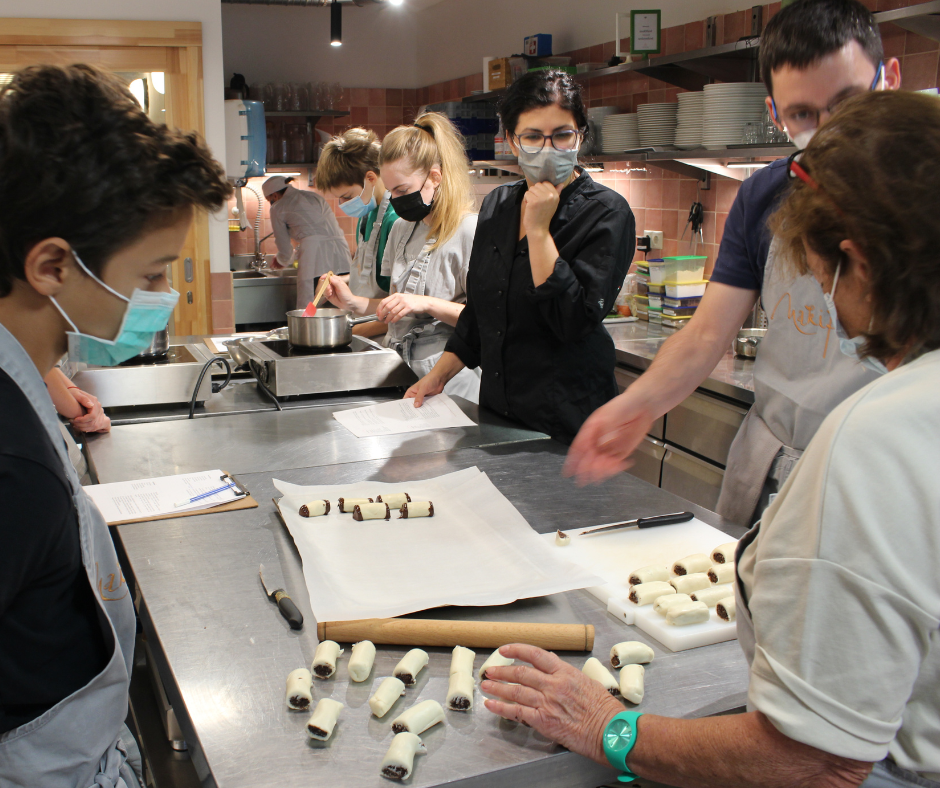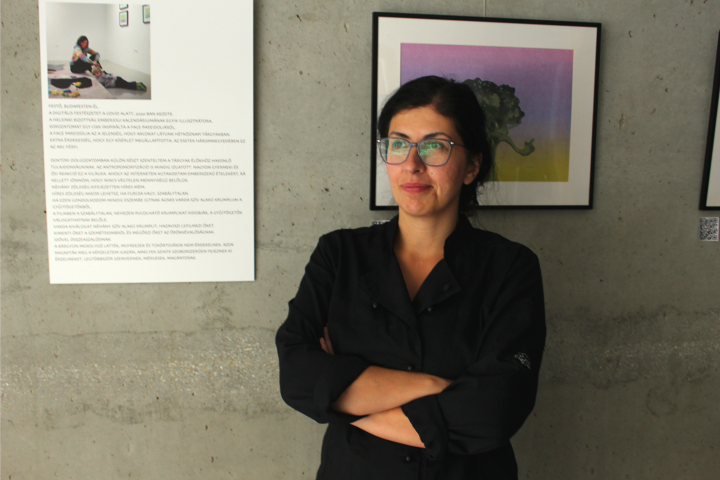Last February, Culinary Institute of Europe launched its one-year Pastry Arts Program, which is taught by a team of Hungarian and international pastry chefs. Sarah Alwazir lived in Hungary until 2009, and worked in event organizer and had little to do with baking. After moving to England, she immersed herself in pastry, first discovering it in her own kitchen at home, and then working and studying in several renowned London bakeries. she later ran her own place in the Camden market in North London for nearly five years. We are delighted that she now shares her expertise and experience with students at Culinary Institute of Europe.
You didn’t study pastry at home, how did you come to do it outside?
I moved to the UK in 2009, and before that I was an event organizer in Hungary, so the plan was to do the same after moving abroad. Unfortunately, I couldn’t find a job, as I lacked local knowledge, so I started baking in my spare time in my sublet. After some time more and more people told me that I should do something with it and encouraged me to start selling them. I didn’t even dare to dream about it, because I had no experience in this field. Then I looked into it and it turned out that the rules in England are less strict than in Hungary, because you can start baking at home and sell it legally. I wanted to learn the basics, but the training programs were very expensive, they costed much more than the CIE Pastry Arts Program, so I started working in a pastry shop. Interestingly, I was working for a Hungarian girl in the beginning, delivering classic English cakes to cafes. Then I joined Primrose Hill as a pastry chef. That’s another difference between the two countries, they don’t look at your qualifications in England if you know what you’re doing. They had a pastry training course, similar to what we do at CIE, and I attended parallely while working for them. After that I worked in quite a few places, including a salsa bar called Floridita in Soho, where I was the only pastry chef. I only lasted a couple of weeks, it was so demanding to work six days a week.
Having your own space is probably every pastry chef’s dream. How have you managed to achieve this?
My husband and I used to talk about how nice it would be to have our own place, but for a long time it was more like a dream. One day we were faced with an offer we couldn’t refuse, and we couldn’t believe it, at Camden Market in North London. It all happened very quickly, we got the keys on Thursday and a week later we were open for business. I’d never used a coffee machine before, I didn’t know how it worked, so we were pretty frozen. Then we worked around the clock for a week, with friends helping out as much as they could. I baked the cakes in my kitchen at home, then we drove them to the café and decorated them. Cupcakes, brownies, muffins were the main profile. I tried the cocoa snail, but it was completely unknown to them, some of them had a couple of knife and fork ideas. As the market really liked the little enchanted world we created with colourful chairs and teapots hanging from the ceiling, they offered us a larger shop space. We spent four years there, and by then we had to hire pastry chefs to help us, but we also trained the baristas to decorate the cakes, which didn’t always go down well. We got very good feedback, with many people saying we had the best cheesecake. I can’t say that I miss the 7 days a week rotation, but it was good. We recently went back to the market, it’s now a Greek restaurant and it looks really bad, we were a bit sad.
How did you decide to start teaching at the Culinary Institute of Europe?
I had been talking to Maki (Maki Stevenson – the founder of the school) for two years, but it wasn’t until I attended Zsófi’s (Zsófi Nábelek, the leader of our Pastry Arts Program) ‘Bejgli workshop’ at Makifood that my baking self was reawakened. I saw the kitchen and realised that I really missed the professional environment, the big oven, and the memories came rushing back. That’s when I wrote to Maki that I would like to teach.
What was it like to teach at CIE for the first time?
I also taught in London, so I have a basis for comparison. I was very nervous in my first class because the kitchen was an unknown place for me, but it’s very well equipped, it can compete with any place in London in terms of the way it’s set up, the size, the facilities, the atmosphere. For me, it’s important to have natural light and not spend half the day in an underground room. The atmosphere of the place matters a lot, I don’t think I would teach in a place that is unlit and depressing, no matter how nice the people around me are. It is also a huge advantage for the students to be able to learn in such a modern place with professional equipment.

What do you think is absolutely essential to become an excellent pastry chef?
Dare to experiment, after you have mastered the basics. Keep up with the trends, because the profession is constantly changing. What I notice is that in Hungary there is always a two-year lag compared to international trends, even though we are not that far from the UK. So I can’t stress enough how important it is to be aware of trends and to dare to try them. The places in this country that are aware of the trends, have a big advantage over the rest.
What is the technique that is the most challenging for you?
I’m not a big fan of the yeasty stuff. Also, sugarcraft has been the biggest challenge for me. It’s particularly important to master the basics and build from there if you want to get to the level where you can create really nice sculptures.
You learnt your trade abroad, but do you recommend that beginner pastry chefs gain experience abroad?
I think it is very important to gain experience abroad because I have seen the attitude there as they encourage you to experiment. There is less pressure to be more bold in Hungary, there is less laxity. In England you can work in a bakery without having any qualifications, so it’s easier to gain experience. It’s definitely good to see what options are out there, how they think elsewhere. If I started a course like Pastry Arts at CIE now, I would definitely go abroad to gain experience.

